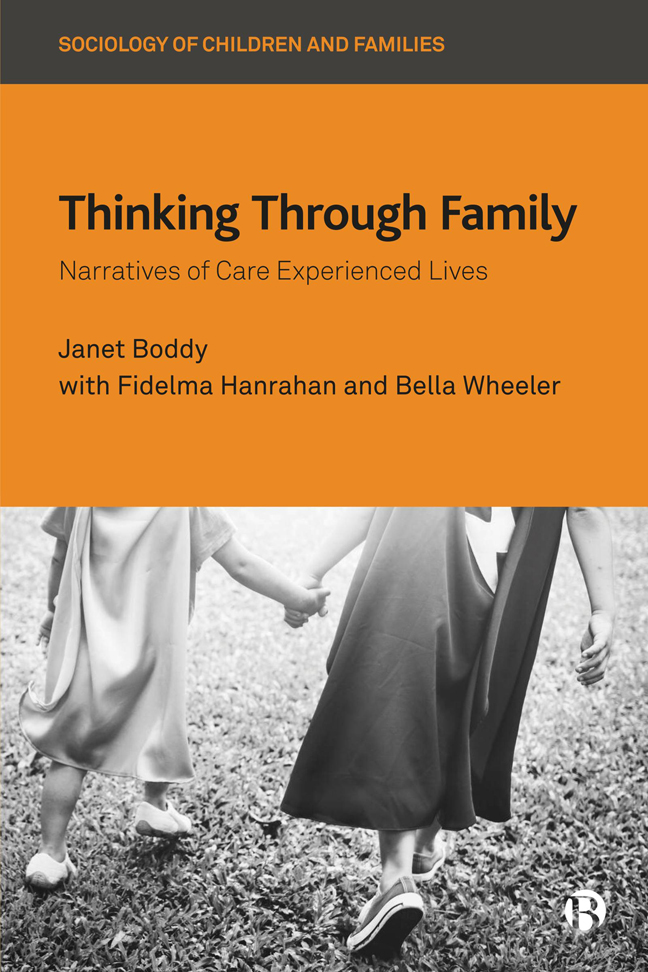Book contents
- Frontmatter
- Sensitive Content in this Book
- Dedication
- Miscellaneous Frontmatter
- Contents
- List of Figures and Table
- Acknowledgements
- 1 Why Think Through ‘Family’?
- 2 Learning From Care Experienced Perspectives
- 3 Doing Family: The Significance of the ‘Ordinary’
- 4 Re/Configuring Boundaries: Who Counts as ‘Family’?
- 5 ‘How Can We Not Talk about Family When Family's All That We’ve Got?’: Care and Connectedness
- 6 Understandings and Experiences of Parenthood
- 7 Thinking Through Family: Implications for Theory and Practice
- Notes
- References
- Index
6 - Understandings and Experiences of Parenthood
Published online by Cambridge University Press: 24 January 2024
- Frontmatter
- Sensitive Content in this Book
- Dedication
- Miscellaneous Frontmatter
- Contents
- List of Figures and Table
- Acknowledgements
- 1 Why Think Through ‘Family’?
- 2 Learning From Care Experienced Perspectives
- 3 Doing Family: The Significance of the ‘Ordinary’
- 4 Re/Configuring Boundaries: Who Counts as ‘Family’?
- 5 ‘How Can We Not Talk about Family When Family's All That We’ve Got?’: Care and Connectedness
- 6 Understandings and Experiences of Parenthood
- 7 Thinking Through Family: Implications for Theory and Practice
- Notes
- References
- Index
Summary
The subjective experience of pregnancy and birth is dependent on the personal and economic circumstances of expectant mothers, their positions within families and the intergenerational legacies that come into play as maternal subjectivities are formed. Bodily situations combine with personal histories to locate women differently in relation to norms and discourses.
Rachel Thomson et al, Making Modern Mothers, 2011, pp 6–7Introduction
Phoenix et al's (1991) edited book Motherhood set out a conceptual distinction between the meanings that motherhood has for women (whether or not they are mothers); the practices of mothering, within the circumstances in which they live, and the ideologies of motherhood, which they describe as common-sense ideas which shape theoretical work and discourses and which ‘help construct what motherhood is considered to be’ (Phoenix et al, 1991, p 5). This distinction is useful in thinking through the understandings and experiences of parenthood for the people who took part in our research. It seems obvious to note that, even when separated from their children, parenthood still has significant meaning in people's lives (see also Morriss, 2018). This chapter will also consider how family is displayed and mothering practised at a distance by women who have lost custody of their children. The analysis also addresses ideologies of care experienced motherhood – considering intergenerational support (and the role of professional support and the ‘corporate grandparent’) alongside experiences of stigma and future imaginaries of family lives.
The chapter is organized temporally and begins by considering experiences of becoming a parent. For the most part, I will talk about mothers, drawing on examples from both studies. All of the women in the Pause evaluation had at least one child, as did four participants in Against All Odds?, one of whom became a mother during the course of the study. Only one respondent in Against All Odds? was a father and the chapter includes his experiences, while attending to other participants’ accounts of fathers’ roles and involvement. The second part of the chapter draws on earlier discussions of family display and practices (Finch, 2007; Morgan, 2011) to consider how family is practised at a distance by women who have had children removed into care or adoption, considering how they manage and maintain identities as mothers separated from their children, taking account of different permanence, placement and contact arrangements.
- Type
- Chapter
- Information
- Thinking through FamilyNarratives of Care Experienced Lives, pp. 120 - 151Publisher: Bristol University PressPrint publication year: 2023



